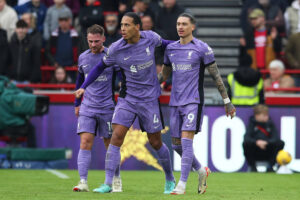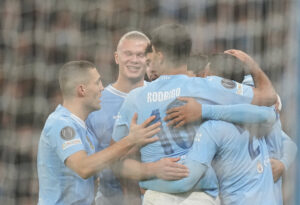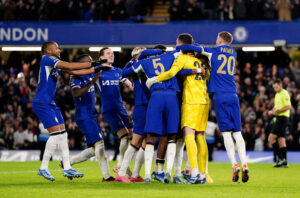In the second of our new series, The Greatest: The Players, Managers and Matches That Made Arsenal, our resident football historian, Martin Keady, looks back at the career of Arsenal’s greatest ever player – Thierry Henry.
As is the case with most football clubs, and especially the biggest clubs, there are several contenders for the title of ‘Arsenal’s Greatest Ever Player’. From Arsenal’s Golden Age of the 1930s, there are Alex James, the original midfield general, and Cliff Bastin, the dynamic winger who for so long (nearly 60 years) was the Gunners’ leading goal-scorer; from the post-war period, there was the sublimely gifted inside forward, Jimmy Logie; and more modern candidates include such genuinely great and gifted players as Liam Brady and Dennis Bergkamp. Ultimately, however, there is only one truly outstanding candidate, the man who did more than anyone in Arsène Wenger’s glorious first decade in charge to destroy the old image of ‘Boring, Boring Arsenal’ – Monsieur Va-Va-Voom himself, Thierry Henry.
The Greatest: Thierry Henry
A Deadly Forward
Before he even joined Arsenal in 1999, replacing Wenger’s original enfant terrible Nicolas Anelka, Henry had already achieved more in the first five years of his career than most players achieve in the entirety of their playing days. He had broken through at Monaco, Wenger’s old club, as a youngster, playing a pivotal part in their 1996/97 Ligue 1-winning side; he had won the World Cup with France in 1998 (although, having begun the tournament in the first team, he was dropped long before the final); and he had earned a move to Juventus, who were not just the best team in Italy at the time (as they usually are) but the best team in Europe, having won the Champions League in 1996 and been runners-up for the next two years. However, it was at Arsenal, under the expert tutelage of Wenger, that an inconsistent winger was turned into the deadliest striker in the world.
Nevertheless, it took Henry a long time to get going at Arsenal. Like so many imports to the Premier League, he struggled initially with the sheer pace and power of English football, qualities that have been retained even as the Premier League has become infinitely more cosmopolitan than when it first began. However, after scoring what would prove to be just the first of many wonder goals at Southampton (taking a short pass from Tony Adams just outside the Southampton penalty box, slipping away from his marker and hammering a curling right-foot shot just inside the right-hand corner of the goal), he was up and running, and he never stopped running, or scoring, for the next eight years.
Intriguingly, though, it is often forgotten that, although Henry is the greatest player in Arsenal’s history, he was probably not the most important signing of the Wenger era. That accolade surely belongs not to Henry, or even to his compatriot and fellow great Patrick Vieira, but to Sol Campbell, who did not arrive at Arsenal until 2001 and his (still) contentious move across north London from Tottenham Hotspur. Henry had been brilliant in his first two seasons at Arsenal, during which time the Gunners had twice finished runners-up to a dominant Manchester United and reached (but lost) both the UEFA Cup final in 2000 and the FA Cup final in 2001. However, it was only when Wenger finally found in Campbell the natural replacement for the fading Tony Adams that the Gunners became sufficiently strong at the back to make the most of Henry’s free-running, dazzling skills and supreme finishing power up front.
The Best Years
What followed were five fabulous years that are undoubtedly the best in Arsenal’s modern history and that still warm the memories of Arsenal fans lucky enough to have lived through them. From 2001 to 2006, Arsenal won the Premier League twice (in 2002 and 2004), the FA Cup three times (in 2002, 2003 and 2005) and should have won the Champions League at least once, if not twice. In 2004, Henry was first among equals in the Invincibles side that were undoubtedly the best team in Europe that year, which probably would have won the Champions League if it had not been for Jens Lehmann, the one non-world class player in the team, conceding two absolute howlers in a 3-2 aggregate defeat to Chelsea in the quarter-final.
In 2006, after Vieira had been replaced by the brilliant young Cesc Fabregas, Arsenal actually made it all the way to the Champions League final. Indeed, they led for most of it after Sol Campbell had headed the Gunners ahead in the first half, even though they were already down to ten men after Lehmann (yep, that ‘Mann’ again) had been sent off early on for bringing down Barcelona’s Samuel Eto’o outside the box. What followed was a rearguard action that was more in keeping with the defensively-minded teams of George Graham and his predecessors than the gloriously flowing football of Arsène Wenger’s best sides. Then came the chance to seal the match and make Arsenal the first team from London to win the European Cup or Champions League.
It fell to Thierry Henry midway through the second half, as Arsenal for once broke away from the Barcelona stranglehold on possession. As Henry bore down on goal, just as he had done a hundred times or more before, it seemed inevitable that he would score, giving Arsenal a 2-0 lead that they would surely have held on to for the rest of the match. Unfortunately, for once, Henry missed, possibly because he was exhausted after running for so far on his own. And the rest, as all Arsenal fans sadly know, is history, as Barca recovered to win 2-1 and that first glorious decade of football under Wenger came to an end, never – as we now know – to be repeated.
Thierry Henry is Adored
It is probably the ultimate testament to the greatness of Thierry Henry as an Arsenal player that almost no Arsenal fan remembers that miss, or if they do it is only after they have first recalled all the other times that he did score the vital goal in a key match, including the amazing winner against Real Madrid in the last 16, when he dribbled from the halfway line to score. That is proof of the sheer adoration that Gunners fans had for the man. He may have missed the chance that would have sealed Arsenal’s greatest ever triumph, but so great were his previous scoring (and assisting) achievements that, incredibly, he was still in credit with them and always would be.
Henry only remained at Arsenal for one more season, before leaving for Arsenal’s conquerors, Barcelona, in 2007. At Barca, he would finally win the Champions League that he never managed to win at Arsenal, as part of Pep Guardiola’s original treble-winning side in 2009. However, at the Catalan giants, he was always in the shadow of the sublime Lionel Messi, one of the very few players from his era (Cristiano Ronaldo and his compatriot Zinedine Zidane are probably the only other two) who could legitimately claim to be a greater player than he was.
In a sense, that only strengthened the connection that Arsenal fans had with Henry. “He may have left us”, they reasoned, “but we had the best of him.” And they did. Furthermore, the fact that he returned for a brief spell in 2012, when he scored not only the winner in an FA Cup home tie against Leeds United but what ultimately turned out to be a crucial winner away at Sunderland in the Premier League (crucial because it helped Arsenal to secure Champions League qualification that season, which is something the club can only dream about now), only added to his legend. As he himself never tired of saying afterwards, in his first, glorious and gloriously long-lasting period, he had been just a player; in those brief few months in 2012, he was more of a fan than a player, and so it meant even more to him to play for the club.
Of course, Henry is now a manager, at Montreal Impact in North America’s MLS, having been an assistant with Roberto Martinez with the Belgium national team and then flopping in his debut stint as a manager at his first club, Monaco, albeit with a side that had been struggling for a long time before he took charge. However, in this long, Coronavirus-enforced hiatus, Arsenal fans still dream that one day Henry the Arsenal manager might achieve even half of what Henry the Arsenal player did. If that ever did come to pass, then putting his incomparable achievements as a player alongside even solid (or at least trophy-winning) achievements as a manager would further enhance his standing at Arsenal, putting him second only behind Herbert Chapman, the Man Who Made Arsenal, as the most important figure in the history of the club.
Main Photo






